Equitible digital tools can boost small-scale fisher livelihoods
While some specific applications of mobile technologies are well understood, their role in governance and development requires further investigation. Information and Communication Technologies (ICTS), such as smart-phones and their applications, cloud storage and data analytics, have the potential to advance human well-being and ecological sustainability, but, if applied incorrectly, they can lead to larger socioeconomic disparities. In low- and middle-income

Equitible digital tools can boost small-scale fisher livelihoods
While some specific applications of mobile technologies are well understood, their role in governance and development requires further investigation. Information and Communication Technologies (ICTS), such as smart-phones and their applications, cloud storage and data analytics, have the potential to advance human well-being and ecological sustainability, but, if applied incorrectly, they can lead to larger socioeconomic disparities. In low- and middle-income countries, ICTs can be used to assist small-scale fishers and fish workers, but illiteracy and unreliable internet connectivity need to be addressed to ensure marginalised fishers are not left behind.
A report produced by WorldFish and FAO, Information and communication technologies for small-scale fisheries (ICT4SSF), evaluates the opportunities and challenges presented by ICTs in forging a more equitable world, with a focus on fisheries and aquatic foos value chain actors.

